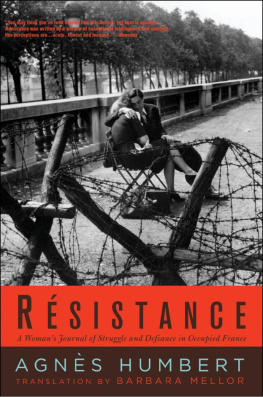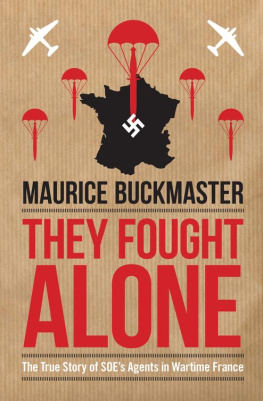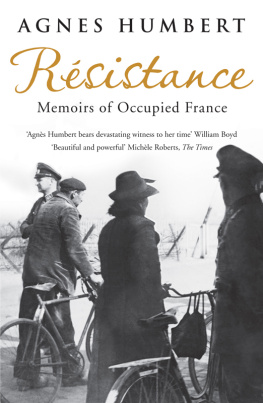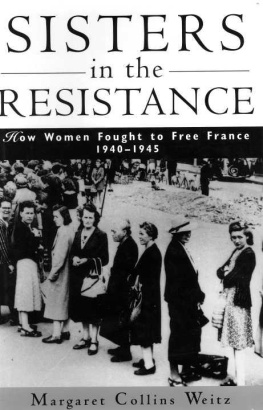January 9, 2016
When people speak of resistance in France, they speak very little of the women who were involved, Michle Mot-Agniel declared. No one ever talks about the women!
There is a reason for that, Anise Postel-Vinay (ne Girard) exclaimed. Women get into the war and then after it they dont talk about what they did. Men love talking about war!
The three of us had been having a lively conversation about what they did in the war for more than an hour by then. A sprightly ninety-year-old with a head full of silvery ringlets, Mot-Agniel hid downed Allied pilots before helping them out of Paris to safety during World War II. She was a teenaged schoolgirl in those days, and she was well aware that her exploits could land her in a concentration camp if she was ever caught. Postel-Vinay, now a bespectacled ninety-three-year-old grande dame, was aware of that risk too. But in her twenties that didnt stop her from gathering surveillance on German troops and passing it on in matchboxes bound for London.
The occupation was heartbreaking for us, Mot-Agniel said. It was intolerable.
Knowing something is heartbreaking and intolerable is one thing, but having the mettle to stand up and do something about it is a whole different story. Thats why I askedcorrection: I beggedto meet these two women, both of them resisters and friends of Genevive de Gaulle Anthonioz. There arent many people like them anymore. So there werent many people better placed to tell me about Genevive during wartime or give me a better understanding of what women like them faced in their fight to reclaim France from the Nazis and then rebuild their own lives at the end of the conflict.
Dont you think that story is important? I asked Mot-Agniel in a near-desperate phone call a few days before our meeting was arranged.
Oui, she told me in her singsongy voice.
Within forty-eight hours of that discussion, Mot-Agniel invited me to a get-together at Mme Postel-Vinays twelfth-floor apartment, overlooking Paris. I brought them miniature red rose plants in gratitude. They treated me to tea, slices of flaky galette des rois, and a couple hours worth of their stories and insights.
People remember the bravery of the Americans and the English, Mot-Agniel said. They dont remember the people who helped the Americans and English.
When Mot-Agniel was fourteen years old, she and her family fled Paris before German troops arrived to take over the capital on June 14, 1940. Three days later, the Mots listened around the radio, horrified as Frances newly appointed prime minister Marshal Philippe Ptain announced that he had asked Hitler for an armistice. None of them felt this betrayal as profoundly as her father did, Mot-Agniel recalled. He had admired the elderly marshal for his heroism against the Germans in Verdun during World War I, so his capitulation to them more than twenty years later was incomprehensible, unthinkable. We must do something! Mot-Agniel remembered her father saying under his breath as Ptains voice crackled over the airwaves.
Five days later, the Mots tuned in to the BBC and heard a young French general implore his country to keep up the fight. His name was Charles de Gaulle, and it was the second time in four days that he had addressed his countrymen from London, calling on their patriotism, common sense, and higher interests to liberate France from the Germans and restore its honor. It was the exact message the Mots had been hoping to hear. When they returned to their home in suburban Paris a few weeks later and found the capital disfigured, their desire to do something was further reinforced. For many French men and women living during that summer of 1940, it was difficult to know how to respond to this indignity. As German forces fanned out across the northern part of France, many of the French walked a fine line between insolence and surrender in order to survive food and supply shortages, curtailed freedoms, and unknown fears. Conversations with friends and neighbors became more tentative, at least until you knew their stance on the occupation and national government, which had since moved southward to the spa town of Vichy.
Not all of the French were inclined to do something in those early moments, but that didnt mean they were all resigned to accept their occupiers dictates. Nineteen-year-old Genevive de Gaulle, niece of that general whose commanding voice captivated the Mot family after Frances fall, began her resistance activities by turning her back on passing Nazi soldiers instead of saluting them. She did not believe France was truly conquered, so she would not submit to a victors rules. Twenty-year-old Jacqueline dAlincourt ventured out each morning with her three sisters to post anti-Nazi posters around their hometown. They concealed their faces with umbrellas to prevent people from determining who was papering local buildings with these notices. Germaine Tillion, a thirty-three-year-old anthropologist, provided prisoners of war with new clothes and identities, hid Jews, countered German propaganda, and transmitted military intelligence to London, all through a resistance network run out of the museum where she worked.
Even those who supported Ptain were anti-German, Postel-Vinay said.
Mot-Agniel remembered the day her teacher visited her house after attending a large student demonstration, which was forbidden at the time. The protest was on Armistice DayNovember 11and early that morning an opposition group placed a wreath at the statue of Georges Clemenceau on the Champs-lyses. On the wreath: a red, white, and blue ribbon and a calling card that was purported to be from General de Gaulle. The ribbon and the calling card mysteriously disappeared shortly after they were discovered, but soon armfuls of bouquets began piling up near the former French premiers statue. By early evening thousands of students and teachers had gathered at the Arc de Triomphe, some of them placing bouquets at the Tomb of the Unknown Soldier, others shouting Vive la France, Down with Ptain, and Down with Hitler into the cool twilight. When fights broke out, the Germans responded by firing into the crowd, making more than one hundred arrests, and then closing off the Champs-lyses. There in the Mot residence, they agreed that the state of affairs was unacceptable. But again, what could you do?











